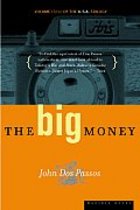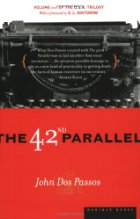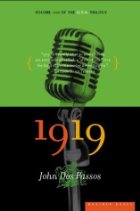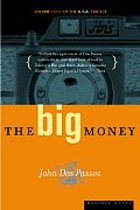
Do you ever start a series, and you're really digging it and read the first few books right in a row, and then decide you don't feel like reading the last book right at the moment, so you take a bit of a break, sure that you'll be back to finish up the series before any time at all because you like it so well, but then one thing leads to another and years have gone by since you devoured the first few books, and the details are no longer clear in your mind, so you put off reading the last book because you have a vague idea you might start the series again from the beginning to remind yourself of all the things you've undoubtedly forgotten in the meantime, but with all the tempting unread books on your list you never feel like making quite that large of a re-reading commitment, so the final book just sits on your shelves for years and years and possibly decades, caught in a kind of limbo, even though you're pretty much guaranteed to enjoy it if you'd just pick it up? Well, that's what happened to me with John Dos Passos's U.S.A. trilogy.
For those who aren't familiar with this trilogy, its novelty is in its form. Dos Passos, an American Modernist and contemporary of Hemingway, Fitzgerald, Stein and the rest of that expat cadre, has assembled something less like a novel and more like a collaged portrait of the United States during three consecutive periods of history: The 42nd Parallel deals with the early years of the 20th century; 1919 is concerned with the American experience of World War I; and The Big Money, the long-awaited (to me) capstone of the trilogy, is concerned with the boom years following the War, during which America was hurtling unknowingly toward the Great Depression. (All three were written during the Great Depression, fro 1930 to 1936, so the shadow of coming events looms large over them, especially the last one.)
The novels in the series share a common structure: they are composed of four different types of sections, which alternate unpredictably with one another like an improvisational jazz piece. The "Newsreel" sections are themselves collages, juxtapositions of newspaper headlines, contemporary speeches, and fragments of popular songs of the time. Dos Passos is excellent, I think, at giving a sense of the sweeping progress of history as found in the minutiae of the popular media, and also a sense of its myopia and the self-serving language of politics, advertising, and the press. Forgive the lengthy block quote, but I think the easiest way to explain the Newsreels is just to show you how they work:
'Twarn't for powder and for storebought hair
De man I love would not gone nowhere
if one should seek a simple explanation of his career it would doubtless be found in that extraordinary decision to forsake the ease of a clerkship for the wearying labor of a section hand. The youth who so early in life had so much of judgment and willpower could not fail to rise above the general run of men. He became the intimate of bankers
St. Louis woman wid her diamon' rings
Pulls dat man aroun' by her apron strings
Tired of walking, riding a bicycle or riding in streetcars, he is likely to buy a Ford.
DAYLIGHT HOLDUP SCATTERS CROWD
Just as soon as his wife discovers that every Ford is like every other Ford and that nearly everyone has one, she is likely to influence him to step into the next social group, of which the Dodge is the most conspicuous example.
desperate revolver battle follows
The next step comes when daughter comes back from college and the family moves into a new home. Father wants economy. Mother craves opportunity for her children, daughter desires social prestige and son wants travel, speed, get-up-and-go.
MAN SLAIN NEAR HOTEL MAJESTIC
BY THREE FOOTPADS
I hate to see de evenin sun go down
Hate to see de evenin sun go down
Cause my baby he done lef' dis town
Juxtaposed with the Newsreels are sections of plain, accessible prose that tell the stories of fictional characters—the most traditional, novel-like elements of the book. These chapters are named for their main characters: "Charley Anderson," "Mary French." More on these later, but they probably make up between two-thirds and three-quarters of the text.
In amongst the Newsreels and story elements, there are also "Camera Eye" sections, in which Dos Passos relates his own experience in stream-of-consciousness prose. This is his attempt to expose the ostensibly "godlike" authorial voice for what it was: just another human living his life. And finally, in addition to the Camera Eye sections, there are also poems scattered through the books which tell the stories of famous real-life people of the era: Henry Ford, Rudolph Valentino, William Randolph Hearst, Thorstein Veblen. These are truthfully my favorite parts of Dos Passos's trilogy; his poem on Eugene Debs in The 42nd Parallel convinced me I'd found a new favorite writer. I think what I love about them is Dos Passos's mixture of resignation, sadness and anger at how, time and time again, complex and contradictory humans let their vices and petty prejudices mar their own endeavors. From "TIN LIZZIE," the poem on Henry Ford:
One thing he brought back from his trip
was the Protocols of the Elders of Zion.
He started a campaign to enlighten the world in the Dearborn Independent; the Jews were why the world wasn't like Wayne County, Michigan, in the old horse and buggy days;
the Jews had started the war, Bolshevism, Darwinism, Marxism, Nietzsche, short skirts and lipstick. They were behind Wall Street and the international bankers, and the whiteslave traffic and the movies and the Supreme Court and ragtime and the illegal liquor business.
Henry Ford denounced the Jews and ran for senator and sued the Chicago Tribune for libel,
and was the laughingstock of the kept metropolitan press;
but when the metropolitan bankers tried to horn in on his business
he thoroughly outsmarted them.
For Dos Passos, Ford's absurd, rabid racism and oddly obsessive provincial nostalgia (his desire that the whole world be "like Wayne County, Michigan, in the old horse and buggy days") coexists with a storyteller's appreciation of his business prowess and the epic change his cars created in the American landscape. Every person is simultaneously great and small, Dos Passos seems to be arguing; every person is at once admirable and hateful. The fact that Ford himself longed for old-fashioned quiet and simplicity, and spent his final years on a restored simulacrum of his father's farm, removed from the noise of his own automobiles, is just the kind of poignant, contradictory detail Dos Passos loves.
The actual "characters" of U.S.A., the ones invented rather than just evoked by Dos Passos, who are the subjects of the trilogy's prose sections, come from a variety of backgrounds, but often work hard to end up in a different part of society than the one in which they started: working-class, middle-America Charley Anderson, for example, gifted with machines and a flying ace in WWI, starts his own aviation company with a friend and ends up wealthy, married to a society girl; meanwhile Mary French, daughter of the Main Line, goes against her mother's wishes and leaves college to be a union organizer and community activist. The common thread, however, is that no matter what Dos Passos characters decide they want, it seldom makes them happy, and they usually end up sabotaging their own efforts in one way or another.
Indeed, the one uniting element of all the U.S.A. characters is that they are slaves to, and undone by, their vices, whether those be for sex, alcohol, social position, or money. The characters who do best both materially and psychologically, like actress Margo Dowling, are usually the most pragmatic, the ones who acknowledge that they're playing a survival game, and look out for themselves and (sometimes) those around them with an utter lack of romanticism. Margo has no grand illusions, especially once she passes the age of about twenty, and that saves her from the pathetic fate of those who keep telling themselves stories about who they are and what they want—stories that get less true all the time. Former golden boy and flying ace Charley Anderson is a particularly pathetic example of the Dos Passos milieu: believing his every whim has a compelling reason behind it (that his lust is love, and his drunken well-being happiness), he descends ever-farther into debt, alienation and alcoholism while telling himself stories about his flying brilliance. Even the activist Mary French, who is probably closest to Dos Passos in her leftist outlook and untiring political work, becomes a victim of her own illusions as she falls in love with a series of condescending, emotionally unavailable fellow activists.
This compulsion, in Dos Passos characters, to let their vices sabotage their dreams didn't bother me as much in the first two books as it did this time around, in The Big Money. I'm not sure if the series actually does become more bitter as it goes along, or whether I've become more sensitive in the ten years since reading the last two books—my guess is that both might be true. It would certainly make sense that, as the country careens toward the crash of 1929, Dos Passos would become more condemnatory of the way Americans were behaving, since he laid the responsibility for the depression of the 1930s squarely on the shoulders of the irresponsible stock market speculators of the 1920s, and on American capitalism as a whole. And it's not that I don't relate to the pattern he lays out—obviously it does happen, and it's a classic setup for a tragedy of the everyday. I just can't help believing that it doesn't happen to everyone—that idealism and dreams, while dangerous as a sole frame of reference, can be an important asset if balanced by practicality.
Despite my qualms about the uniformly miserable characters, though, I remain in awe of Dos Passos's technical verve and audacity, and I love the way he simultaneously creates a broad canvas of events on the national level, and an intimate canvas of regular individuals making their way.
The Big Money was my fourth book in my personal TBR Challenge.




